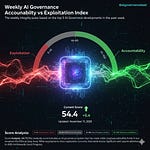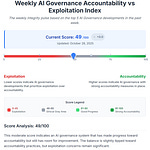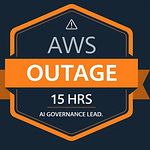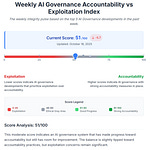Welcome to this week’s issue of AI Governance in action
In This Issue:
Meta acquires a 49% stake in ScaleAI and recruits Alexandr Wang (CEO) to lead Meta’s super intelligence team.
Short overview of ScaleAI and why they matter
Timeline of ScaleAI launch to Google, X and OpenAI exiting contracts
Why this move slipped past regulators
Opportunity for Founders
Wrap Up
Questions for Risk Managers and Procurement Leads
In the early days of AI, governance meant principles. Contracts set in stone. Stability. Risk audits. Alignment frameworks. But in 2025, it looks like this:
Your most trusted data labeling vendor gets a $14.3B investment from your competitor. A week later, sensitive client docs are leaked from public Google Drives.
Welcome to the new frontier of AI governance where infrastructure neutrality is existential.
🚧 What Just Happened
Meta now owns 49% of Scale AI, once seen as the “Switzerland” of data labeling. This was the vendor Google, OpenAI, Anthropic, xAI, and the U.S. DoD trusted for:
Red-teaming frontier LLMs
Annotating high-sensitivity data
RLHF workflows and evaluations
Meta’s move also absorbed Alexandr Wang, Scale’s founder, to lead their new superintelligence division. And even with claims that ScaleAI would still be a neutral vendor, within days:
OpenAI and Google began exiting contracts
Surge, Mercor, and Labelbox reported record client interest
Business Insider uncovered a leak of confidential client data—including model alignment strategies and misconduct flags—from public Google Docs
So much for trust. But let’s briefly explain Scale AI and why they matter.
📦 What Is Scale AI, and Why Do They Matter?
Founded in 2016 by Alexandr Wang, Scale AI quickly became the invisible backbone of the AI ecosystem.
Its niche? High-fidelity, human-in-the-loop data infrastructure. Its clients? A staggering list of big tech’s hyperscalers and labs:
OpenAI (red-teaming and safety evaluations)
Google (Gemini alignment data)
Microsoft, xAI, Anthropic, Meta,
U.S. Department of Defense
Its offerings include:
Reinforcement learning with human feedback (RLHF)
Edge-case annotation for LLMs and perception models
Red-teaming workflows and evals
Synthetic and multilingual dataset creation
Until recently, Scale was the biggest player in this arena (valuated at 29B) and marketed itself as vendor-agnostic infrastructure.
That pitch no longer flies.
📆 ScaleAI’s Timeline: From “Switzerland” to Stakeholder
2016–2023:
Scale grows into the data backbone for frontier labs and defense partners
Raises over $1.6B in venture funding
May 2024:
Announces $1B Series F at a $13.8B valuation
June 2025 (Let’s count the red flags):
🚩 Meta announces a $14.3B investment for 49% of Scale AI
🚩 Alexandr Wang joins Meta to lead its superintelligence lab
🚩 Scale insists it remains “independent”
🚩 OpenAI, Google, and xAI begin exiting contracts within 72 hours
June 25, 2025:
🚩🚩Business Insider leak: Client documents, sensitive workflows, and misconduct tags exposed via public Google Docs
🚩Exposed info includes:
Google using ChatGPT to pressure-test Gemini
xAI’s secret “Xylophone” research
Internal misconduct alerts and evaluator instructions
⚖️ What’s My AI Governance Breakdown?
I can’t classify this as a bad vendor situation. It’s actually a new kind of systemic risk for big tech. Here’s why:
✅ Meta’s Move Was 'Shady’ but Legal
They bought 49%, not 51%. No automatic antitrust trigger. No regulatory review. Technically and legally clean.
🧠 But It Wasn’t Symbolically Neutral
Scale was trusted with sensitive data from Meta’s competitors. Remember them? Google, OpenAI, X, Department of Defense and more. The moment Meta became a strategic co-owner, neutrality collapsed even if access controls held.
🚨 Then the Data Leak Hit
Publicly accessible docs on Google Drive exposed confidential info across multiple clients. Even if accidental, the timing amplified the trust shock. The downstream impacts feel obvious:
🔄 Downstream Impacts
Vendor fragmentation: Labs are now diversifying rapidly - Labelbox, Surge, and Mercor are scrambling to take share.
Trust clauses: AI labs are adding “vendor neutrality” and “acquisition triggers” to contracts in response to this unforeseen risk.
Regulatory wakeup: The FTC is now reportedly reviewing “quasi-acquisitions” for future rulemaking.
🧮 The Competitive Angle
Meta’s move created a vacuum and the ecosystem is flooding in to fill it. None of Scale’s rivals are as big, but they all recognize there’s an opportunity to grow fast:
Surge AI: Already crossed $1B in revenue
Labelbox: Already partnered with Google Cloud post-Scale AI rupture
Mercor: Gaining traction with labs focused on privacy and on-prem RLHF
Snorkel AI, CloudFactory, Appen: circling upmarket
Founders, there’s a void in the market. Feel free to step in with a niche offering.
Job seekers note: These companies will likely be hiring!
🚨 Wrapping It Up
Before foundation models took center stage, a vendor changing hands might’ve raised eyebrows but it rarely rewrote the safety posture for an entire industry. In 2025, it does. Because when your data supply chain merges with your rival’s roadmap, it’s not just awkward. It’s existential.
Meta didn’t break any laws by buying 49% of Scale AI. But it cracked something deeper: the assumption that your infrastructure partners won’t become your competitors’ strategic assets overnight.
This is the governance game now. No more cute, compliance checklists. Don’t make any assumptions, procure with caution and have a plan C on hand to effectively react to these regulatory gray areas.
🚨 Questions for Risk Managers and Procurement Leads
🧩 For Risk Managers:
"Could we have seen this coming?" Maybe. But if not, the goal is to see the next one.
Do we have a current map of third-party vendors critical to model training, evaluation, or deployment?
Have we assessed the M&A exposure of our infrastructure providers—especially those without acquisition-trigger clauses?
If a vendor were suddenly acquired by a competitor or aligned investor, what red lines would we act on immediately?
Do we perform posture checks on vendors beyond cybersecurity—like governance transparency, neutrality, and data provenance?
🪢 For Procurement & Partnerships Leads:
“Neutrality used to be implicit, now it’s contractual.”
Do our vendor agreements include governance change-of-control clauses or termination triggers tied to ownership shifts?
Are we overly dependent on one vendor for data labeling, evaluation, or synthetic generation?
Do we require vendors to disclose material partnerships or equity stakes that could affect conflict-of-interest posture?
What’s our pivot plan if a core vendor becomes strategically entangled with a competitor?
🚪If you made it all the way here, I commend you and I invite you to bring your thoughts and insights to our chat. We’re a community of 600 subscribers who’d love to hear what you think.
Sources:
https://www.msn.com/en-us/news/technology/openai-drops-scale-ai-as-a-data-provider-following-meta-deal/ar-AA1GYJFY
https://www.forbes.com/sites/janakirammsv/2025/06/23/meta-invests-14-billion-in-scale-ai-to-strengthen-model-training/
https://www.computerworld.com/article/4009714/metas-14-3b-stake-triggers-scale-ai-customer-exodus-could-be-a-windfall-for-rivals-like-mercor.html












